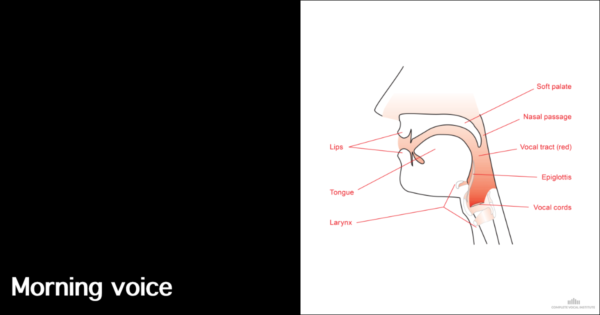The ‘constrictor muscles’ that shape the vocal tract are very useful and also protect the vocal folds if a singer is exposed to great strain. The throat constricts if, for example, we lift something heavy or become emotional or frightened. Constriction of the throat is quite practical when we lift something heavy, because it prevents a strain on the vocal folds, but it is very impractical to constrict uncontrolled around the voice when we sing as the vocal folds must have room to stretch. Thus, we talk about uncontrolled constriction of the throat being the singer’s main enemy, not constriction or the constrictor muscles themselves.
It is not difficult for the vocal folds to stretch or slacken, but it becomes difficult if the movement is obstructed. An obstruction is any uncontrolled constriction that prevents the vocal folds from stretching, thereby making it difficult to reach higher notes. A singer will try even harder to reach the note, often worsening the uncontrolled constriction. Eventually the vocal folds will not stretch at all. The singer may conclude, ‘I have a low voice, I am unable to reach the high notes’ but this is not the case! The reason why the high notes fail is not a lack of vocal ability to reach high notes but uncontrolled constriction around the vocal folds, robbing them of the space required for them to work, which is to stretch in order to reach the high notes. The ‘constrictor muscles’ of the throat contribute to this uncontrolled constriction.
Avoiding uncontrolled constriction
Singing requires physical strength but this can also cause uncontrolled constriction of the throat. We must therefore, by correct technique, trick the constrictor muscles in the throat into not constricting uncontrolledly even when we sing technically difficult and physically demanding material. This is often called keeping an ‘open throat’. To be precise, it is not possible to ‘open’ the throat, it is only possible to avoid constricting it. When the uncontrolled constriction is gone the stretching of the vocal folds is unhindered, the pitch is secure, and wear or fatigue of the vocal folds is avoided. Basically, singing techniques are about avoiding uncontrolled constriction, and this is obtained by using support, amongst other things. With efficient, solid support we can use lots of physical strength without uncontrolled constriction in the throat. A skilled singer knows the feeling of uncontrolled constriction and is able to avoid it in all situations.

